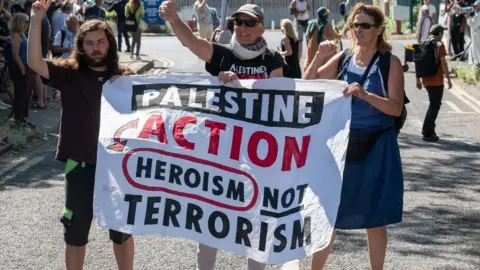In a significant legal development, **Palestine Action**, an activist group known for its direct action protests against firms linked to the Israeli military, has been granted permission to challenge a ban imposed by the UK government under terrorism legislation. The High Court’s decision to allow the review of the ban comes amidst a backdrop of controversy surrounding the group’s actions and the government’s justification for its proscription.
The group faced a sweeping ban imposed in June by **Home Secretary Yvette Cooper** after activists reportedly incurred approximately £7 million worth of damage at **RAF Brize Norton**, a key military facility. This action was part of a series of direct actions conducted by Palestine Action since its formation in July 2020, targeting companies associated with the Israeli defense sector. Critics of the ban, including Palestine Action’s co-founder **Huda Ammori**, argue that the government’s actions infringe upon the right to free speech and effectively suppress legitimate protest activities.
The ruling by **Mr. Justice Chamberlain** noted that the ban could potentially contradict principles of free expression. He expressed concern that the Home Secretary may not have adequately consulted Palestine Action prior to enacting the ban, which now categorizes participation or support for the group as a terrorism-related offense, punishable by up to 14 years in prison. The judge emphasized the importance of urgently reassessing the ban in court to prevent potential legal chaos, as individuals facing prosecution related to the group’s activities might argue against the legality of the ban, leading to conflicting judicial outcomes across various courts.
Compounding this situation, the ruling highlights the government’s own difficulties in managing the legal and operational ramifications of the ban. Over 200 arrests have been made since the proscription was implemented, targeting individuals demonstrating support for Palestine Action. In the judge’s view, prolonged delays in judicial review could confuse the legal landscape, leaving individuals accused of supporting the group exposed to inconsistent judicial interpretations.
Palestine Action’s unique status as the first group banned under a specific terrorism-related definition in the UK raises critical questions about the government’s criteria for such proscription. **Government documents** reviewed during the case indicate that officials deliberated for nearly eight months before deciding to utilize terrorism laws against the group, illustrating the complexities and debated nature of the situation. Observations made by police and advisory bodies reveal a recognition that conventional laws might not sufficiently address the group’s alleged disruptive activities.
Despite concerns of potential backlash and perceptions of government overreach, the UK’s Home Office proceeded with the ban, particularly following heightened public tensions and security assessments linked to previous protests. Officials communicated fears that the proscription might be interpreted as a form of state repression, potentially threatening social cohesion among various communities, particularly within the British Muslim demographic.
The legal challenge initiated by Palestine Action and Huda Ammori underscores the critical intersection of activism, legal rights, and governmental authority in contemporary society. As legal proceedings continue, implications surrounding freedom of speech, the right to protest, and definitions of terrorism in the context of activism remain pivotal issues at the forefront of this legal and social discourse. The unfolding situation not only reflects the broader Israeli-Palestinian conflict but also engages with vital questions regarding individual rights and the balance of power between government mandates and civil liberties in democratic societies.











